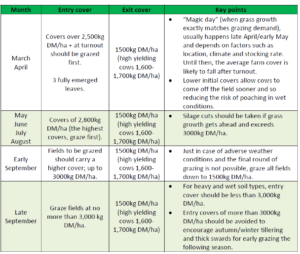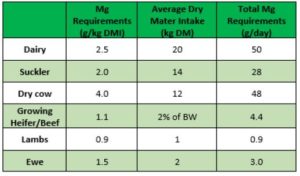The sun’s shining, soil temperature is increasing, grass is growing and farmers across the country are starting to turnout their cattle!
Grass is a very important resource for livestock and when managed, grassland provides an economical feed source all year round; either as grazing or for conserved forage.
The management of pasture is important to ensure it is utilised to a high level without damaging the ley. 
Managing poaching
Managing poaching is crucial as poaching damage has negative consequences for grassland productivity. Here are some key management points:
- Consider grazing options; on/off grazing, mob grazing system.
- Strip grazing using a back fence.
- Using narrow temporary lanes for cows to access the back of paddocks.
- Closely watching reliable weather forecasts.
- Careful selection of paddocks for grazing in wet weather
- For track areas, create drainage systems in high risk areas
- Position feed and water troughs away from watercourses
- Think about preplacing silage bales in fields – this can help limit the amount of travelling on the ground during wetter conditions.
Supplementation at grass
It is important to consider vitamin and minerals at grass. Requirements are based on supplementary level due to the wide variation of supply from grass. One of the first minerals to consider at turnout is magnesium. Pasture is relatively low in magnesium, which can decrease further with fertiliser (NPK) application.
Magnesium
- Essential major mineral which is required for the nervous system and
psychological processors. - Linked to bone formation (most of mag is found in the skeleton; 60-70%) – Bone reserves are not released in times of deficiency.
- Mag is known to be important for regulating blood calcium, sub-clinical
hypomagnesaemia can increase the risk of milk fever. - High Potassium can interfere with the absorption of magnesium.
Magnesium is not stored in the body and therefore needs a constant daily supply, see the table below for requirements.
Why is it seen at turnout?
- Less supplementary feeding.
- Spring grass is low in Mg due to rapid growth.
- Lush, low dry matter grass increases rumen outflow rate, preventing the concentration of Mg within the rumen fluid from reaching high enough levels to fully saturate the transport sites for magnesium in the rumen.
Dietary factors on Mg absorption
- Potassium binds magnesium
- Aluminium, from soil contamination can bind mag.
- Rumen passage rate and flush of grass.
- High dietary N.
Absorption is variable, from 0-50%. In practice the absorption can be assumed to vary between 15-30%.
If the intake is greater than what is used it is excreted in urine. The rumen needs a daily supply as Mg is mainly absorbed in the rumen.

Too much Mg would cause scouring. What if fed in the morning would be utilised in the afternoon. It is recommended that feeding twice a day in compound feed will fulfil daily requirements.
Symptoms of Grass Staggers
- Feed intakes reduced.
- Nervousness, excitable and restless.
- Walking stiffly with high head carriage.
- Muscle twitching.
- Wide eye share.
- Neurological disorders (such as muscle spasms).
- In server spasms, head will tend to arch backwards.
- Frothing at mouth.
- Cow unable to stand up
NWF Mg Solutions
✓ Compound feeds: Magnesium is included in NWF standard summer diets. Pasture dusting/spraying, aiming to increase uptake by coating swards. Reapplication should be done after heavy rainfall and dew.
✓ Minerals/buckets: A range of options which are available, from free access minerals to hi mag buckets. Rock salt/salt lick can enhance magnesium uptake from the rumen.
✓ Water: Magnesium chloride flakes can be added to provide supplementation (they can be added to TMR’s also).
✓ Drench with Magnesium sulphate or chloride
For more information on NWF magnesium buckets, powdered minerals or our summer compound feeds, speak to your local NWF Sales Specialist, or call 0800 756 2787.
Sources: Trouw GB | NADIS | DairyCo Grass+

